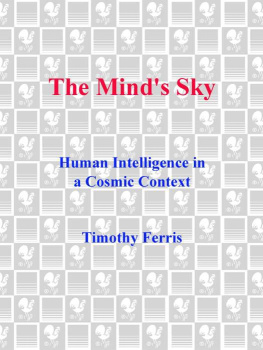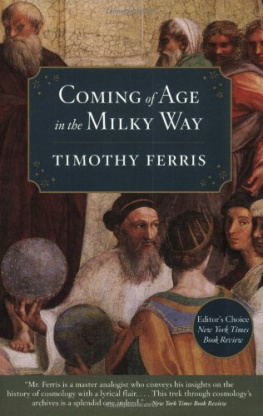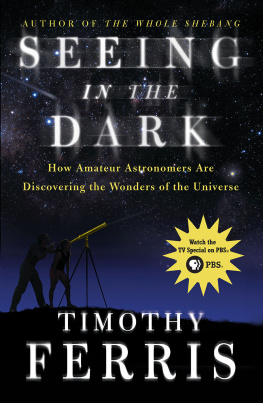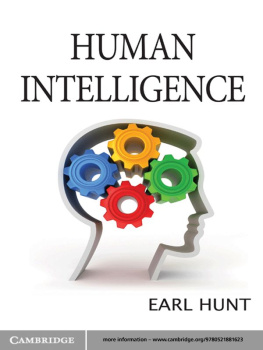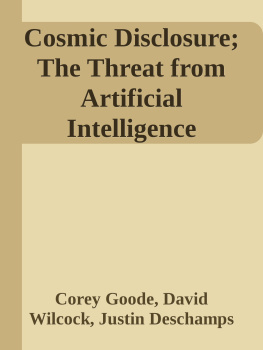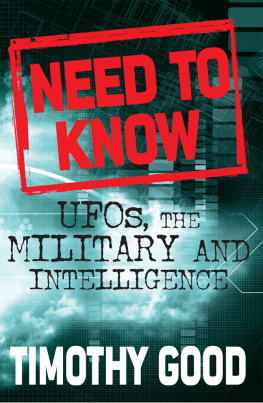Timothy Ferris - The Minds Sky: Human Intelligence in a Cosmic Context
Here you can read online Timothy Ferris - The Minds Sky: Human Intelligence in a Cosmic Context full text of the book (entire story) in english for free. Download pdf and epub, get meaning, cover and reviews about this ebook. year: 1993, publisher: Bantam Books, genre: Romance novel. Description of the work, (preface) as well as reviews are available. Best literature library LitArk.com created for fans of good reading and offers a wide selection of genres:
Romance novel
Science fiction
Adventure
Detective
Science
History
Home and family
Prose
Art
Politics
Computer
Non-fiction
Religion
Business
Children
Humor
Choose a favorite category and find really read worthwhile books. Enjoy immersion in the world of imagination, feel the emotions of the characters or learn something new for yourself, make an fascinating discovery.
- Book:The Minds Sky: Human Intelligence in a Cosmic Context
- Author:
- Publisher:Bantam Books
- Genre:
- Year:1993
- Rating:3 / 5
- Favourites:Add to favourites
- Your mark:
- 60
- 1
- 2
- 3
- 4
- 5
The Minds Sky: Human Intelligence in a Cosmic Context: summary, description and annotation
We offer to read an annotation, description, summary or preface (depends on what the author of the book "The Minds Sky: Human Intelligence in a Cosmic Context" wrote himself). If you haven't found the necessary information about the book — write in the comments, we will try to find it.
The Minds Sky: Human Intelligence in a Cosmic Context — read online for free the complete book (whole text) full work
Below is the text of the book, divided by pages. System saving the place of the last page read, allows you to conveniently read the book "The Minds Sky: Human Intelligence in a Cosmic Context" online for free, without having to search again every time where you left off. Put a bookmark, and you can go to the page where you finished reading at any time.
Font size:
Interval:
Bookmark:
B OOKS BY T IMOTHY F ERRIS
The Red Limit
Galaxies
SpaceShots
The Practice of Journalism (With Bruce Porter)
Coming of Age in the Milky Way
World Treasury of Physics, Astronomy, & Mathematics (Editor)
The Minds Sky

For Patrick
All things without, which round about we see,
We seek to know, and how therewith to do;
But that whereby we reason, live and be,
Within ourselves, we strangers are thereto.
We that acquaint ourselves with every zone
And pass both tropics and behold the poles,
When we come home, are to ourselves unknown,
And unacquainted still with our own souls.
Sir John Davies, 1599
Living matter and clarity are opposites.
Max Born, letter to Einstein, 1927
E ach of us inhabits two equally mysterious universes, one outside the mind and the other within it. Since my youth I have tried to understand the relationship between these two realms. Many a night I sat at the telescope till dawn, marveling at the soft pewter glow of the distant galaxies, the glittering gold and silver star fields of the Milky Way, at sun-hugging Mercury, the pearl-white crescent of Venus, or the parchment-sharp rings of Saturn, and wondered what we have to do with all that.
I have never shared the sentiment that the enormity of the cosmos need make us feel insignificant. The stars are too involving for that; they stimulate our curiosity, arouse us to reflection, nourish our sense of beauty, and challenge our conception of who we are. We feel connected to them, somehow. I do not think this intuition can be dismissed as mere sentiment, for the simple reason that we are able to some degree to understand what goes on out there. We know that iron oxide stains the ruddy sands of Mars, that helium atoms dance in the upper atmosphere of the sun, that storms dot the surface of Aldebaran, and that new stars are being born in the Tarantula nebula; we can predict eclipses of the satellites of Jupiter, weigh the great Catherine wheel of the Andromeda galaxy, take the temperature of Triton, and age-date the craters of the moon. Our knowledge of the universe amounts, of course, to an infinitesimal fraction of the whole, but the fact that we can learn anything at all about the stars suggests that thoughtand maybe even intelligenceis not a purely parochial phenomenon, the product of our one world alone, but may have universal currency.
I envision our relationship to the universe as symmetrical, hourglass-shaped. On one side is the outer realm, inhabited by galaxies, stars, the plants and animals, and our fellow human beings. Most of us (the solipsists aside) believe that this outer world exists, though we appreciate that our direct perceptions of it are limited and skewed. On the other side is the inner realm of the mind, where each of us is destined to live and die; here resides all we can ever know. Through the neck of the glass flow the sense data by which we perceive the outer realm, and (flowing the opposite way) the models and concepts we apply to nature, and the alterations and abridgments we impose on her. We tip this imaginary hourglass from time to time. In the nineteenth century, when classical physics ruled, we tended to think of the sand as flowing almost entirely from the outer to the inner realm, from an objectively real world to our passively recording minds. In the twentieth century the concept of observer-dependent phenomena in quantum physics has shifted our attention to the ways our observations influence how we perceive nature. But so long as there are thinking beings in the universe, neither bulb of the hourglass will ever be empty.
In this book I offer a few thoughts on the relationship between mind and universe as seen through the lenses of two innovative fields of scientific researchneuroscience, and the search for extraterrestrial intelligence, or SETI.
Neuroscience has begun to reveal some fascinating things about how the brain works, shedding light on the concept of personal identity, the data-handling limitations of the central nervous system, and the way that the brain smooths over its liabilities and discontinuities to sustain a sense of unified consciousness. We are beginning to realize that each of us really does contain multitudes, as Walt Whitman put it, and that the chorus of voices within was built up over eons of evolution, like geological strata in the Burgess Shale or the White Cliffs of Dover.
SETI, meanwhile, has focused attention on what we mean by intelligence, and whether its like is to be found elsewhere in the universe. Regardless of whether we eventually succeed in intercepting an alien signal from space, SETI will have encouraged us to think about thinking in a cosmic context. In so doing it acts as a mirror; our ignorance of the role of life and thought in the universe forms the blacking on the back of the mirror.
This book begins and ends with cosmologically related questions; in between, it examines implications of neuroscience for our understanding of the human brain. Part One examines some of the images we find in the SETI mirror when we think of intelligence in terms of its cosmic context; it outlines how interstellar communications systems might in the long run evolve (or have evolved). Part Two explores the inner world; its thesis is that each of us harbors not one but many minds, which if true suggests that ones individual brain is a galaxy of various intelligences. In Part Three I endeavor to braid these two threads, to see what the outer world can tell us about the inner and vice versa.
The final chapter seeks to demonstrate that science, rather than having to choose either mind or nature as the ultimate reality, can instead be based on the information adduced where mind and nature meet. It is more rigorous than the other chapters, and while I would prefer that it be widely read and discussed, I must in all candor admit that it probably can be skipped without irrevocable harm to ones intellectual development.
Indeed, the reader is invited to pick and choose among these chapters as he or she may prefer. This book is a ramble, not a work of analytic philosophy. It seldom pretends to have said the last word about anything. Much of it takes place far from the palaces of hard science, in lush but jumbled jungles where fact and speculation compete. I expect no one to agree with all that I have to say, and will be content if some care enough to disagree.
Work on The Minds Sky was expedited by leaves of absence generously granted me by the University of California, Berkeley. Some of its contents evolved in preparing for lectures presented at the American Association for the Advancement of Science annual convention in 1990, Nobel Conference XXVII, and the Dutch National Science Week in 1991; I am grateful in this connection for the gracious hospitality of the AAAS, the University of Groningen, the University of Enschede, and Gustavus Adolphus College.
Among the many individuals who have helped me, I should like in particular to express my gratitude to William Alexander, Walter Alvarez, Annie Dillard, Richard S. Dinner, Harriet Fier, Michael Gazzaniga, Stephen Jay Gould, Linda Grey, Owen Laster, Michael McGreevy, Michael Mann, Leslie Meredith, Menno Meyjes, Richard Muller, Thomas Powers, Steve Rubin, David Schramm, John Sepkoski, Alex Shoumatoff, Jill Tarter, and John Archibald Wheeler; to my mother, Jean Baird Ferris, for many enlightening conversations and a constant stream of intriguing articles and news clippings; and to my wife, Carolyn, for contributions any proper allusion to which would fill a book in itself.
Next pageFont size:
Interval:
Bookmark:
Similar books «The Minds Sky: Human Intelligence in a Cosmic Context»
Look at similar books to The Minds Sky: Human Intelligence in a Cosmic Context. We have selected literature similar in name and meaning in the hope of providing readers with more options to find new, interesting, not yet read works.
Discussion, reviews of the book The Minds Sky: Human Intelligence in a Cosmic Context and just readers' own opinions. Leave your comments, write what you think about the work, its meaning or the main characters. Specify what exactly you liked and what you didn't like, and why you think so.

